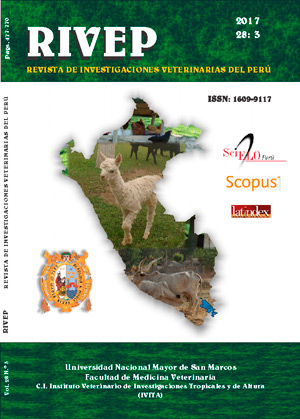Effect of coffee (Coffea arabica) pulp meal as feed on productive parameters of guinea pigs (Cavia porcellus l) – Peru breed
DOI:
https://doi.org/10.15381/rivep.v28i3.13362Keywords:
body weight gain, feed conversion, carcass yield, sensory evaluation, concentrate, nutritional valueAbstract
The objective of this study was to determine the effect of feeding guinea pigs (Cavia porcellus L) – Peru breed with coffee (Coffea arabica) pulp meal on productive parameters during the rearing and fattening stages. A total of 35 female guinea pigs were monitored from 28 to 91 days of age, and fed with alfalfa and concentrate (1:1). The animals were randomly distributed in five treatments with inclusions of 0, 5, 15, 25 and 35% of coffee pulp meal in the concentrate. The addition of the coffee pulp meal to the concentrate did not affect body weight gain, feed conversion and sensory quality (appearance, odor, carcass color and meat taste) but had an inverse relationship with feed consumption. The highest carcass yields were obtained with the inclusion of up to 25% of coffee pulp meal in the concentrate. Therefore, coffee pulp meal, as an input to formulate guinea pig concentrates, has the potential to increase the productive performance.Downloads
Downloads
Published
Issue
Section
License
Copyright (c) 2017 Ives Yoplac, Juan Yalta, Héctor V. Vásquez, Jorge L. Maicelo

This work is licensed under a Creative Commons Attribution-NonCommercial-ShareAlike 4.0 International License.
AUTHORS RETAIN THEIR RIGHTS:
a. Authors retain their trade mark rights and patent, and also on any process or procedure described in the article.
b. Authors retain their right to share, copy, distribute, perform and publicly communicate their article (eg, to place their article in an institutional repository or publish it in a book), with an acknowledgment of its initial publication in the Revista de Investigaciones Veterinarias del Perú (RIVEP).
c. Authors retain theirs right to make a subsequent publication of their work, to use the article or any part thereof (eg a compilation of his papers, lecture notes, thesis, or a book), always indicating the source of publication (the originator of the work, journal, volume, number and date).










